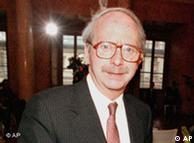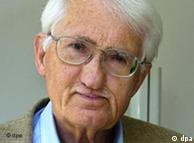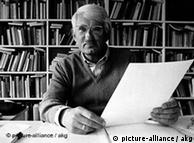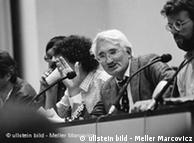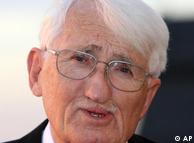Obituary | 18.06.2009
German sociologist Ralf Dahrendorf dies
Dahrendorf gained fame in the English-speaking world as head of the London School of Economics (LSE), a post he held from 1974-84, and as an Oxford University professor.
He wrote a number of articles and books in the field of sociology, including “Reflections on the Revolution in Europe,” and the “Modern Social Contract.”
Marxist roots
Born on May 1st, 1929 in Hamburg, Dahrendorf's academic career began at the University of Saarbrücken in 1957 when he was awarded a professorship of sociology. There he wrote a thesis on class conflict and Karl Marx.
Although his ideas changed over the years, he remained committed throughout his entire career to the idea of a democratic society, pointing out in many of his writings how societies and institutions inexorably fail to live up to their ideals.
Career in politics
In the 1970s, Dahrendorf was a German member of the European Commission, where he represented the liberal Free Democrats (FDP). He served a short term as a junior foreign minister in what was then the German capital, Bonn. In 1988, however, Dahrendorf resigned from the FDP.
In Britain, he sat in the House of Lords as an independent after Queen Elizabeth II granted him a life peerage in 1993.
Londoner at heart
In 1988, Dahrendorf obtained British citizenship without giving up his German passport. Since retiring, however, he lived in Cologne, choosing to move back to Germany to be closer to his family.
Asked once in an interview what city he considered his home, he said, "I am a Londoner."
Dahrendorf was married three times, to British, US, and German partners. He is survived by three daughters from his first marriage.
glb/dpa/Reuters
Editor: Susan Houlton
Lord Ralf Gustav Dahrendorf, Baron Dahrendorf, KBE (born May 1, 1929) is a German-British sociologist, philosopher, political scientist and politician.
He was born in Hamburg, the son of Lina and the late Gustav Dahrendorf, a social democrat member of the German Parliament. He studied philosophy, classical philology and sociology at Hamburg University between 1947 and 1952, became a doctor of philosophy and classics (Dr. phil.) in 1952. He continued his academic research at London School of Economics as a Leverhulme Research Scholar in 1953-54, gaining a PhD degree in 1956. He was a professor of sociology in Hamburg (1957-60), Tübingen (1960-64) and Konstanz (1966-69).
From 1969 to 1970 he was a member of the German parliament for the Freie Demokratische Partei (Free Democratic Party) (the German liberals), and a Parliamentary Secretary of State in the Ministry of Foreign Affairs. In 1970 he became a Commissioner in the European Commission in Brussels. From 1974 to 1984 he was director of the London School of Economics, when he returned to Germany to become Professor of Social Science, Konstanz University (1984-86).
1967-1970 he was Chairman of the Deutsche Gesellschaft für Soziologie, resigning it when he took up his office at Brussels. Between 1976 and 1979 he led the educational sub-committee of the Benson Commission.[1]
He settled in the United Kingdom in 1986, becoming a Governor of the London School of Economics, and also from 1987 to 1997 Warden of St Antony's College at the University of Oxford, succeeding the historian Sir Raymond Carr.
Having adopted British citizenship in 1988, he was granted a life peerage in 1993 and was created Baron Dahrendorf of Clare Market in the City of Westminster by Queen Elizabeth II. He sits in the House of Lords as a cross-bencher. On July 11, 2007, he was awarded the Prince of Asturias Award for Social Studies.
His famous book Class and Class Conflict in Industrial Society (1959) argued that Marx defined class too narrowly and in a historically-specific context. Instead of describing the fundamental differences of class in terms of property, Dahrendorf claimed that power was at the root of differences in class. Thus, society could be split up into "order takers" and "order givers".
In January 2005, he was appointed a Research Professor at the Social Science Research Center Berlin (WZB)[1].
Further reading
- Julie Smith, Ralf Dahrendorf (Lord Dahrendorf) in Brack et al. (eds.) Dictionary of Liberal Biography; Politico's 1998 pp89–90
- Julie Smith, Ralf Dahrendorf in Brack & Randall (eds.) Dictionary of Liberal Thought; Politico's 2007 pp83–85
Works available in English
- Dahrendorf, Ralf. (1959) Class and Class Conflict in Industrial Society. Stanford: Stanford University Press.
- Dahrendorf, Ralf. (1967) Society and Democracy in Germany. New York & London: W. W. Norton & Company.
- "The Modern Social Conflict". University of California Press: Berkeley and Los Angeles, 1988
- Dahrendorf, Ralf (1990) Reflections on the Revolution in Europe: In a letter intended to have been sent to a gentleman in Warsaw. New York: Random House.
Works available in German
- Die angewandte Aufklärung: Gesellschaft u. Soziologie in Amerika. Piper, München 1962
- Homo Sociologicus: ein Versuch zur Geschichte, Bedeutung und Kritik der Kategorie der sozialen Rolle. Westdeutscher Verlag, Köln/Opladen 1965
- Gesellschaft und Demokratie in Deutschland. Piper, München 1965
- Konflikt und Freiheit: auf dem Weg zur Dienstklassengesellschaft. Piper, München 1972, ISBN 3-492-01782-7
- Pfade aus Utopia: Arbeiten zur Theorie und Methode der Soziologie. Piper, München 1974, ISBN 3-492-00401-6
- Lebenschancen: Anläufe zur sozialen und politischen Theorie. Suhrkamp-Taschenbuch, Frankfurt a.M. 1979, ISBN 3-518-37059-6
- Die neue Freiheit: Überleben und Gerechtigkeit in einer veränderten Welt. Suhrkamp, Frankfurt a.M. 1980, ISBN 3-518-37123-1
- Die Chancen der Krise: über die Zukunft des Liberalismus. DVA, Stuttgart 1983, ISBN 3-421-06148-3
- Fragmente eines neuen Liberalismus. DVA, Stuttgart 1987, ISBN 3-421-06361-3
- Der moderne soziale Konflikt: Essay zur Politik der Freiheit. DVA, Stuttgart 1992, ISBN 3-421-06539-X
- Die Zukunft des Wohlfahrtsstaats. Verl. Neue Kritik, Frankfurt a.M. 1996
- Liberale und andere: Portraits. DVA, Stuttgart 1994, ISBN 3-421-06669-8
- Liberal und unabhängig: Gerd Bucerius und seine Zeit. Beck, München 2000, ISBN 3-406-46474-2
- Über Grenzen: Lebenserinnerungen. Beck, München 2002, ISBN 3-406-49338-6
- Auf der Suche nach einer neuen Ordnung: Vorlesungen zur Politik der Freiheit im 21. Jahrhundert. Beck, München 2003, ISBN 3-406-50540-6
- Der Wiederbeginn der Geschichte: vom Fall der Mauer zum Krieg im Irak; Reden und Aufsätze. Beck, München 2004, ISBN 3-406-51879-6
- Werner Bruns, Döring Walter (Hrsg): Der selbstbewusste Bürger. Bouvier Verlag
- Engagierte Beobachter. Die Intellektuellen und die Versuchungen der Zeit, Wien: Passagen Verlag 2005.
- Versuchungen der Unfreiheit. Die Intellektuellen in Zeiten der Prüfung . München 2006, ISBN 3-406-54054-6
See also
References
- ^ "Emerald: Article Requests: Indefinite articles". Emerald Group Publishing. http://www.emeraldinsight.com/Insight/viewContentItem.do;jsessionid=9F328F753CC45ECD41DD5147379E5983?contentType=Article&hdAction=lnkpdf&contentId=1702699&history=true. Retrieved on 2009-05-27.
External links
- Ralf Dahrendorf's syndicated monthly op/ed columns for Project Syndicate"Against the Current" is Ralf Dahrendorf's monthly series for Project Syndicate.
- Straddling Theory with Practice - Conversation with Sir Ralf Dahrendorf by Harry Kreisler of the Institute of International Studies; 4 April 1989
